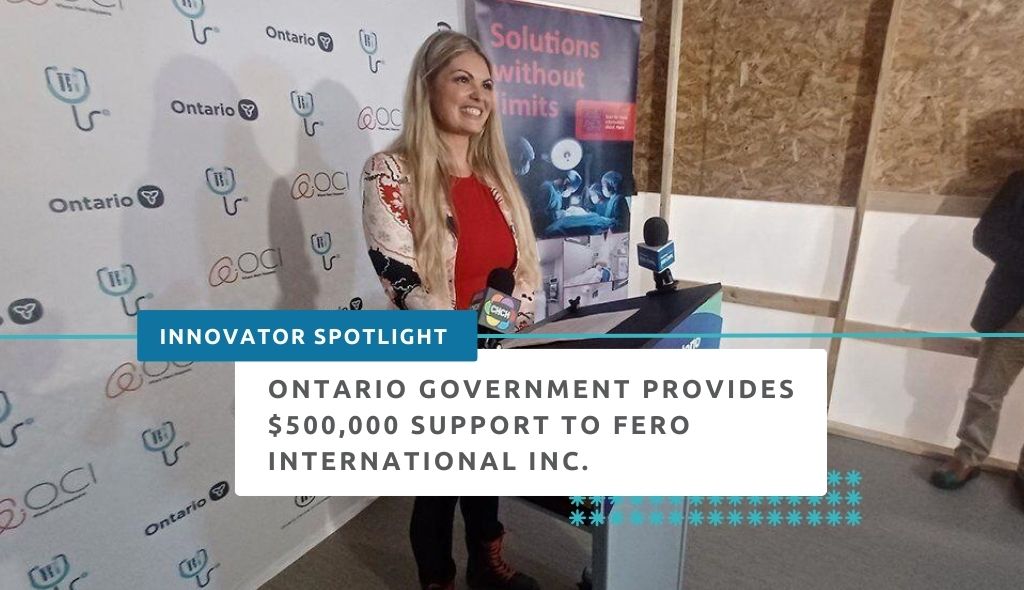As a female chief executive officer for Fero International Inc., Sabrina Fiorellino knows how difficult it is to raise critical funding to expand a business.
A 2020 study by Crunchbase that examined diversity and inclusion in the venture capital industry found only about 2.3 per cent of women founders of companies received the billions of dollars in global venture capital funds available, a decline from 2.8 per cent in 2019.
“Being a female-led company makes it difficult to raise funding,” said Fiorellino, founder and chief operating officer for the Stoney Creek-based Fero Industrial Inc.
Founded in 2020, the company — which builds sustainable and cost-effective modular structures, principally for the health care industry, but can be used in remote areas, war zones and disaster sites — has experienced rapid expansion and is in need of capital to meet the rising demand, said Fiorellino.
So the business executive was more than grateful for the $500,000 from the Ontario government’s $3-million announcement made by Economic Development Minister Vic Fedeli on July 27 at Fero International’s Stoney Creek location on South Service Road.
“This investment is especially significant to us,” said Fiorellino, inside one of the company’s structures that would soon be shipped to Winnipeg. “We are extremely grateful.”
The investment, said Fiorellino, will be used to hire four more people to the business’ 10-person staff and purchase capital equipment to meet expansion plans.
“It’s very expensive to build traditional infrastructure,” Fiorellino said in an interview. “We can build it quicker. We are giving (hospitals, health-care facilities) capacity now, so they are not missing anything.”
Fero focuses on medical services able to create a 5,200-square-foot modular structure within seven months for a hospital emergency facility, she said. The strategy is to reach up to 200,000 square feet of modular structures every year.
Fiorellino said the company is looking at expanding its modular structures to include diagnostics for long-term care, reno dialysis, mini-hospitals and clinics.
Other life sciences companies that will receive $500,000 each include the Kitchener-based KEEP Labs Inc., which has developed a small storage device to help patients monitor their medication dosage; InventoRR MD, located in Toronto, which has developed several products for trauma and general surgery; Juniper Genomics, based in Toronto, which uses genome sequencing and bioinformatics to give patients better information to ensure embryo transfers for in vitro fertilization (IVF) will succeed; Mimosa Diagnostics Inc. from Toronto, which has developed a way to peer under the skin for injuries before they are visible to the naked eye; and the Toronto-based Gotcare, which uses virtual technology to provide home care to communities across the country.
“It’s what we need to bring health care to Ontarians,” said Carol MacDonald, Gotcare co-founder and president.
She said the funding will help the company, created in 2018, train about 50,000 health care providers who will be able to provide biometric testing to individuals living in remote communities.
The $3 million, said Fedeli, will be matched by over $12 million in private sector co-investments.
“That is a four-to-one ratio,” said Fedeli. “I can’t wait to see what you achieve. I look forward to continued growth.”
The funding is from the Life Sciences Innovation Fund, overseen by the Ontario Centre of Innovation, which has so far invested $218 million into 959 companies, creating or retaining over 6,640 jobs.
Hamilton East-Stoney Creek Progressive Conservative MPP Neil Lumsden, who accompanied Fedeli, said Ontario has the largest life science sector in the country, and it has been a “driving force of the Hamilton economy.”
“This is the right place to come and turn new ideas into reality,” he said.





